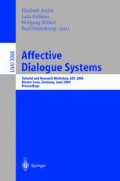Abstract
As computer systems are evolving and coming to be regarded as social actors, the importance of social intelligence that enables natural and socially appropriate interactions is gaining a growing interest among the human-computer interaction researchers. This article discusses the definition, importance, and benefits of social intelligence as agent technology. It then describes a collaborative learning system that incorporates agents that are equipped with a social intelligence model. We argue that socially appropriate affective behaviors provide a new dimension for collaborative learning systems. The system provides an environment in which learning takes place through interactions with a coaching computer agent and a co-learner, an autonomous agent that makes affective responses. The social intelligence model that handles affective responses is based on psychological theories of personality, emotion, and human-media interaction, such as appraisal theory and the Media Equation. Experiments conducted with this collaborative learning system to examine the effect of the social intelligence model suggested that users had more positive impressions about the usefulness, the application, and their learning experience when the co-learner agent displayed social responses with personality and emotions than when it did not express them. It should be noted here that the co-learner agent did not provide any explicit assistance for the learner, such as giving clues and showing answers, yet it influenced the user’s evaluation on the usefulness of the learning system. Experimental data also suggest that the co-learner agent contributed to the effectiveness of the learning system.
Access this chapter
Tax calculation will be finalised at checkout
Purchases are for personal use only
Preview
Unable to display preview. Download preview PDF.
References
Berscheid, E., Walster, E.: Interpersonal Attraction. Addison-Wesley, Reading (1978)
Brave, S.: Agents that care: Investigating the effects of orientation of emotion exhibited by an embodied computer agent. Unpublished doctoral dissertation. Stanford University (2003)
Brave, S., Nass, C.: Emotion in human-computer interaction. In: Jacko, J., Sears, A. (eds.) The Human-Computer Interaction Handbook, pp. 81–93. Lawrence Erlbaum Associates, Mahwah (2003)
Clore, G.L., Byrne, D.: A reinforcement-affect model of attraction. In: Huston, T.L. (ed.) Foundations of Interpersonal Attraction, pp. 143–165. Academic Press, New York (1974)
Curtis, R.C., Miller, K.: Believing another likes or dislikes you: Behaviors making the beliefs come true. Journal of Personality and Social Psychology 51, 284–290 (1986)
Goodman, B., Soller, A., Linton, F., Gaimari, R.: Encouraging student reflection and articulation using a learning companion. International Journal of Artificial Intelligence in Education 9(3-4) (1998)
Heider, F.: The Psychology of Interpersonal Relations. Wiley, Hoboken (1958)
Kasai, T., Okamoto, T.: Kasoteki kyocho kankyo-niokeru ejento-kan koraboreshon (Collaboration among agents in a virtual collaborative learning environment 40(11), 3934–3945 (1999)
Katagiri, Y.: Robotto-no shakaiteki chino (Social intelligence of robots.) Johoshori 44(12), 1233–1238 (2003)
Lang, P.J.: The emotion probe. American Psychologist 50(5), 372–385 (1995)
Maldonado, H., Hayes-Roth, B.: Toward cross-cultural believability in character design. In: Payr, S., Trappl, R. (eds.) Agent culture: Designing Virtual Characters for a Multi-Cultural World, Lawrence Erlbaum Associates, Mahwah (2004)
Maslow, A.H.: Toward a Psychology of Being. D. Van Nostrand Company, New York (1968)
Moreno, R., Mayer, R., Spires, H., Lester, J.: The Case for social agency in computer-based teaching: do students learn more deeply when they interact with animated pedagogical agents? Cognition and Instruction 19(2), 177–213 (2001)
Reeves, B., Nass, C.: The Media Equation. Cambridge University Press, Cambridge (1996)
Author information
Authors and Affiliations
Editor information
Editors and Affiliations
Rights and permissions
Copyright information
© 2004 Springer-Verlag Berlin Heidelberg
About this paper
Cite this paper
Morishima, Y. et al. (2004). The Role of Affect and Sociality in the Agent-Based Collaborative Learning System. In: André, E., Dybkjær, L., Minker, W., Heisterkamp, P. (eds) Affective Dialogue Systems. ADS 2004. Lecture Notes in Computer Science(), vol 3068. Springer, Berlin, Heidelberg. https://doi.org/10.1007/978-3-540-24842-2_28
Download citation
DOI: https://doi.org/10.1007/978-3-540-24842-2_28
Publisher Name: Springer, Berlin, Heidelberg
Print ISBN: 978-3-540-22143-2
Online ISBN: 978-3-540-24842-2
eBook Packages: Springer Book Archive

